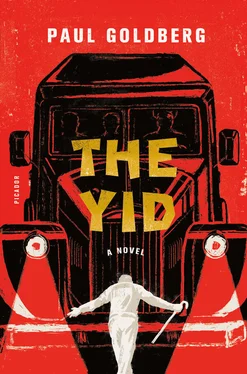He would do Senderl, too, but he doesn’t have a dress. A critic might object that all the rogues listed above have their endearing qualities. Endearing to some audiences, Lewis would respond. To him, these characters are only slightly more appealing than Comrade Jim.
“Zakurit’ est’?” asks one of the thugs. Do you have a smoke?
“Prostite mene, ya ne kuryu,” says Lewis with a solicitous smile, in butchered Russian. Forgive me, but I don’t smoke.
“Kent, look, a Yid!”
“Ya takoy zhe Sovetsky grazhdanin kak vy,” says Lewis proudly. I am a Soviet citizen, just like you.
“Khuy ty. A nu goni den’gu!” says Kent. Hand over the money, dickhead.
“Take it! Take it, comrade. Just don’t beat me!” whines Lewis.
With a shaking hand, Lewis hands Kent the money — ninety rubles and some change.
“A nu Tarzanchik, vrezh yemu,” says Kent, who in some situations couldn’t help sounding effeminate. Slam him.
Lewis is wide open. When it comes, the slam of Tarzan’s fist is as halfhearted as the MGB soldier’s knock on Levinson’s door.
“Govno! Maratsya ne khochetsya,” says Tarzan, spitting through his teeth and kicking Lewis in the ribs. Shit! Don’t want to step in it.
“Same here, asshole,” whispers Lewis as his hand fondles the handle of Lieutenant Sadykov’s pistol.
Lewis doesn’t look his best when he walks through the door of Kogan’s dacha. The fist has smudged the white makeup on his face, and a chunk of ice Lewis used to minimize the swelling returned half of his face to its original color.
As he walks in, Lewis notices a small spetsovka overcoat and a small military hat on the bentwood Thonet coatrack.
The tone of conversation he hears is different from what he has come to expect from Levinson and Kogan: it’s clear, with just a bit more projection. Lewis steps back outside and, with a handful of snow, removes what’s left of his white face.
There is a young lady at the dacha.
“Kima Yefimovna, this is my friend Friederich Robertovich Lewis,” says Kogan.
For an instant, Lewis gets the impression that Kima looks at him with a volatile combination of bashfulness and interest. Lewis believes that while all women instantly pass judgment on men they meet, Russian women are more likely to act on their initial impulses.
Of course, men of forty and older are known to misread the looks they get from younger women. Lewis reminds himself that the girl is probably not longing for old men like himself (he is forty-two). This has to be doubly true for even older men like Levinson and Kogan.
Something about Kima seems to conjure images of a Young Communist from wartime propaganda, a selfless heroine who spits in the faces of the Nazis. He can imagine her saying something like “You can kill me now, but others will come to avenge me,” or perhaps “Long live Stalin!” She seems constricted, cold, irresistible.
Lewis bows like a Chekhovian fool.
“Pleasure to meet you…”
Kima’s eyes — emerald, hardened with a drop of cobalt — reduce him to babbling idiocy. Colors this intense should be used lightly, and, mercifully, the shape of Kima’s eyes is more Asian than Slavic. Her patronymic — Yefimovna — is likely Jewish, though.
Clearly, the bow and the officious greeting make the girl uncomfortable. That is just fine, Lewis reminds himself. She is too young. Besides, his own life changed irrevocably the moment he stepped into the blood of Lieutenant Sadykov.
“Kima Yefimovna is the finest source of local news,” Kogan continues obliviously. “She lives in the railroad barracks and works in bottle redemption. All the news reaches her first.”
The bottle redemption station is an odd place for Kogan to find friends.
These are dungeons where drunks bring their glassware. That crowd is motivated by simple incentives: redeem the bottle you bought the night before and get enough change for the first beer of the morning. Decent people show up in such places every now and then, usually days before payday, when money runs short, carrying milk bottles and wide-mouthed jars, determined to avoid conversations with fellow customers and to emerge with a pocketful of change.
How did this seemingly intelligent girl end up in the dungeon? Lewis smells a tragedy.
“They are putting together lists,” says Kima. Cautiously, Lewis lets his gaze slip down her jacket. He sees little evidence of breasts.
“A chto znachitsya v etikh spiskakh?” asks Levinson. And what figures in these lists?
He stands by the table, his tall, distinguished torso clad in a smoking jacket that has the look of something taken off a White Army officer, perhaps in 1918. Alternatively, it came from a costume shop. And, yes, he wears an ascot. As previously established, actors of burned-down theaters have a special affinity for ascots.
“Jews,” answers Kima. “And half-Jews.”
“Whatever for?” asks Lewis.
Having spent two days traveling by railroad from Siberia, he should have been aware of all the widely circulated rumors.
“The rumor is, for deportation,” says Kima. “The depots are filled with cattle cars.”
“Which depots?”
“They say in Bykovo, Ramenskoye, Lyubertsy. And there are trains on spare railroad spurs.”
“That could be anything,” says Kogan. “They could be having…”
“Military maneuvers,” offers Levinson.
“Yes, military maneuvers.”
“I hear people talk,” says the girl. “People you don’t know, in the railroad barracks. They say the trains are here for the Jews.”
“This could be just a fantasy of certain strata of the working class,” Kogan offers.
Lewis is puzzled. Why would the fate of the Jews be of such intense interest to this steely-eyed, über-Slavic Young Communist? What is she doing in the hideaway of two old goats and a Negro? Can she be trusted?
“You shouldn’t worry, Kima,” says Kogan. “It cannot happen.”
“It cannot!” Levinson confirms.
“Even if it’s being planned, Stalin will not allow it,” declares Kogan with certainty.
“Please don’t try to shield me,” she says with frustration.
“What are you really afraid of, Kima?” asks Kogan.
She says nothing, only her chin juts upward, away from Kogan, away from Levinson. At a perfect forty-five-degree angle, she looks at Lewis yet past him. Tears well in her eyes as though against her will, as an unwanted consequence of an internal battle she seems to be slowly, painfully losing. Lewis contemplates her tears. They would be cold, malformed, he thinks.
He wants to touch her, not at all out of anything prurient, but out of an irrational belief that a touch could console her profound sadness.
“I know a lot more than you think,” she blurts out, childlike, then, getting up, storms out, slamming the door.
“Sirota…” Kogan shrugs his shoulders. An orphan.
To him, this fully explains Kima’s outburst. Lewis needs something more tangible.
Why are the old goats trying to negate the information that she had brought to them?
Certainly, deportation is plausible. Comrade Stalin had performed several, starting with wealthy peasants in the twenties and thirties. Having learned from Hitler’s experience during the war, he started to target entire nations: the Volga Germans, the Crimean Tatars, the Chechens, the young Lithuanian men. These deportations were manmade cataclysms from which there was no shelter.
“Comrade Stalin will not allow it?” asks Lewis after Kima slams the door.
“He will not!” repeats Levinson, pointing at the heavens in a merciless parody of himself. “Not our Iosif Vissarionovich!”
Читать дальше












